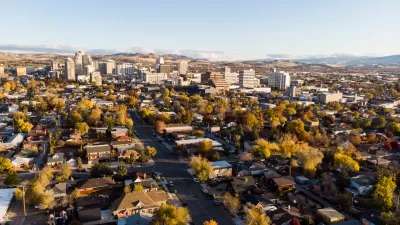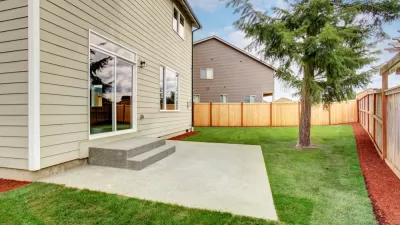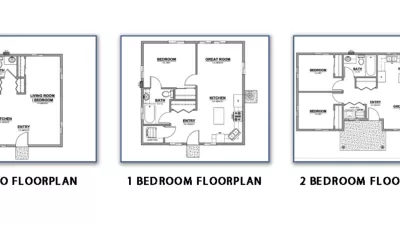Maine could become the third state to eliminate single-family-only zoning to encourage light density increases in residential areas and make it easier for homeowners to build accessory dwelling units.

The Maine state legislature is one step closer to passing a bill legalizing duplexes, accessory dwelling units, and other “missing middle housing” types in neighborhoods previously zoned for single-family homes. As Christian Britschgi writes, the state is following the example of California and Oregon, which have both eliminated single-family only zoning and, in the case of California, established housing production goals.
“The measure has attracted bipartisan support, reflecting a growing consensus that local governments' zoning regulations are making housing unaffordable and that state preemption of those regulations is one means of bringing housing costs down and returning rights to property owners,” Britschgi says.
Maine's legislation would require municipalities to allow two-unit homes everywhere that single-family homes are allowed today, and to allow four-unit homes in designated growth areas. The bill would also guarantee homeowners the right to build accessory dwelling units (ADUs)—sometimes known as granny flats or in-law suites—on their single-family properties.
The bill would allow localities to limit ADU size, but ban them from requiring additional on-site parking. “The bill also eases density restrictions and parking requirements for deed-restricted affordable housing in multifamily-zoned areas. Provided they offer units for rent or sale at specific below-market rates, these developments can be built at 2.5 times the density of whatever the multifamily zone already allows.”
Critics of the bill say taking control away from local leaders could lead to overdevelopment and strained infrastructure and local services. Some also point out the nebulous and shifting definition of “affirmatively furthering fair housing.”
Others question whether the legislation would have any impact at all—California’s early experience does not exactly inspire confidence, although the state is taking steps to make ADU construction cheaper and more feasible for more property owners. According to Britschgi, allowing localities to set rules for ADUs “opens the door to localities setting up lengthy, discretionary approval processes that discourage people from actually building them.”
FULL STORY: Maine Could Be the Third State To End Single-Family-Only Zoning

Alabama: Trump Terminates Settlements for Black Communities Harmed By Raw Sewage
Trump deemed the landmark civil rights agreement “illegal DEI and environmental justice policy.”

Planetizen Federal Action Tracker
A weekly monitor of how Trump’s orders and actions are impacting planners and planning in America.

The 120 Year Old Tiny Home Villages That Sheltered San Francisco’s Earthquake Refugees
More than a century ago, San Francisco mobilized to house thousands of residents displaced by the 1906 earthquake. Could their strategy offer a model for the present?

LA’s Tree Emergency Goes Beyond Vandalism
After a vandal destroyed dozens of downtown LA trees, Mayor Karen Bass vowed to replace them. Days later, she slashed the city’s tree budget.

Sacramento Leads Nation With Bus-Mounted Bike Lane Enforcement Cameras
The city is the first to use its bus-mounted traffic enforcement system to cite drivers who park or drive in bike lanes.

Seattle Voters Approve Social Housing Referendum
Voters approved a corporate tax to fund the city’s housing authority despite an opposition campaign funded by Amazon and Microsoft.
Urban Design for Planners 1: Software Tools
This six-course series explores essential urban design concepts using open source software and equips planners with the tools they need to participate fully in the urban design process.
Planning for Universal Design
Learn the tools for implementing Universal Design in planning regulations.
Ada County Highway District
Clanton & Associates, Inc.
Jessamine County Fiscal Court
Institute for Housing and Urban Development Studies (IHS)
City of Grandview
Harvard GSD Executive Education
Toledo-Lucas County Plan Commissions
Salt Lake City
NYU Wagner Graduate School of Public Service





























